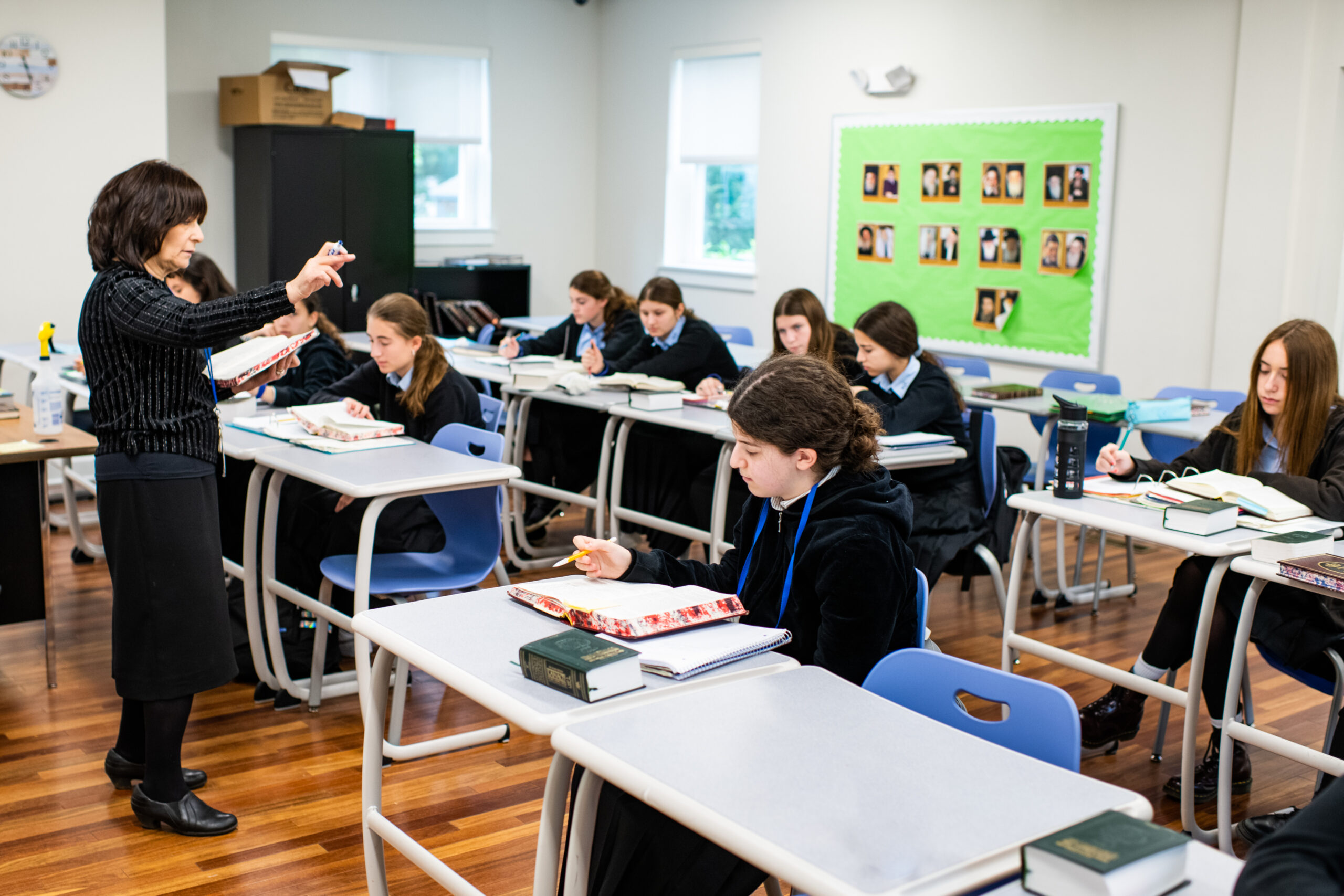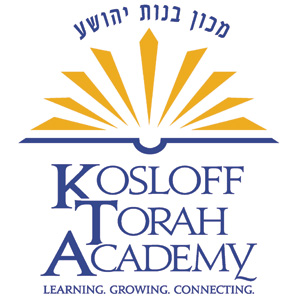Limudei Kodesh
Click on a topic to expand
Chumash
Chumash classes at KTA seek to convey to students the eternal messages of Torah as understood through the prism of divrei Chazal, while giving them the textual proficiency necessary to become independent learners. Students study a different sefer each year: שמות, במדבר, דברים and בראשית. Instruction is offered at three levels – Honors, Standard and Skill Building- so that each student may progress at the pace best suited to her learning needs. At every level, students explore the Chumash through close analysis of pshat (text) and mefarshim (classical commentaries). The curriculum emphasizes both iyun (in depth) and bekius (survey) styles of learning, which stimulate conceptual thinking and foster skill development.
Chumash instruction at the Honors level trains students to analyze the pshat (text) and mefarshim (commentaries) and independently discover deeper levels of meaning. Through challenging experiences with textual reading, chavrusa learning, and independent preparation, the student develops a strong foundation of Hebrew and Aramaic vocabulary, as well as a comprehensive understanding of Biblical grammar and syntax (the way words, clauses and sentences relate to each other). Students gain exposure to a wide range of mefarshim, and learn to recognize and appreciate the unique perspective of each. By her senior year, the Honors level student will be able to independently research Chumash topics and will be prepared for acceptance into rigorous seminaries that expect a high level mastery of text study.
The Standard level Chumash program is designed to systematically develop the student’s understanding of the text and mastery of Biblical vocabulary, dikduk (grammar), and syntax. Emphasis is placed on the development of analytical skills and skill in reading and understanding mefarshim. Much attention is devoted to mastering Rashi and discovering the wealth of knowledge that is unlocked through an in-depth analysis of Rashi’s commentary. Students gain exposure to the commentaries of other Rishonim and Acharonim, as well, with the goal of inspiring them with an understanding of the deep hashkafic insights that intensive text study uncovers and revealing the relevance of Torah study to their personal lives.
The Skill Building Chumash program is geared to students with less facility in Hebrew language, and focuses on developing the basic skills that will enable them to discover the deeper meanings embedded in the text. Much time is devoted to practicing the skills of reading and translating פסוקים and Rashi. Students learn how to analyze Rashi’s commentary, and to identify what Rashi is asking and why. They are introduced to the conceptual analysis of Rishonim and Acharonim, and are guided in exploring and discussing the Halachic and Hashkafic lessons that are derived from Chumash. Instruction is designed to be both didactic and inspirational, and to instill in students an appreciation for the beauty and relevance of Torah.
Kesuvim
Kesuvim: The Kesuvim curriculum introduces students to the five מגלות, and to ספר משלי and ספר תהלים. Through close study of the text with mefarshim, students gain familiarity with the historical background of each of the מגלות, as well as in depth understanding of their language and timeless messages. The twelfth grade Tehillim course teaches students how to use ספר תהלים as a guide for fundamental Jewish השקפה. Students explore selected פרקים based on ראשונים, אחרונים, and modern פרשנים. The focus on דוד המלך’s detailed and poetic language is balanced with an emphasis on pulling threads of meaning through the פרק as a whole. Assessment in the course is varied and creative, in order to allow students with diverse learning styles to apply תהלים’s lessons in ways that are personal and relevant.
The Mishlei course covers selected topics that focus on תיקון המדות (self-improvement). Students analyze פסוקים together with selected ראשונים to construct an understanding of particular מדות and how שלמה המלך defines them. Class discussions explore relevant scenarios where a specific מידה can be applied in our daily lives, and how we can improve ourselves in those spiritual areas. Additional source materials from more modern commentaries and ספרים are used to enhance understanding and application of the concepts in משלי.
Tehillim course
Halacha
Halacha (Standard and Honors, Grades 9, 10, 11 and 12): The Halacha curriculum emphasizes both the principles of Jewish law and their practical application. Students are introduced to the four sections of Shulchan Aruch, with the goal of broadening their knowledge of everyday Halacha and deepening their understanding of the Halachic process. Halacha is taught by talmidei chachamim who are prominent Rabbanim in the community. The four year sequence addresses halachos bein adam la’makom, -including topics such as Jewish holidays, Shabbos, Brachos, Tefilla, and Kashrus – and halachos bein adam l’chavero ( interpersonal relationships) – including topics such asיחוד, צדקה, אבלות, כבוד אב ואם, כבוד הרב, גמילות חסדים and Business Ethics.
Honors level Halacha courses are text based, engaging students in the study of the שלחן ערוך and its commentaries. Honors level students must have a reasonable level of fluency in Hebrew and proficient textual skills. Students in the Standard level classes develop a clear understanding of Halachic practice by means of lecture, discussion, audio-visual demonstrations, and the study of texts in English.
Navi
Navi: The Navi curriculum at KTA gives students extensive exposure to both Neviim Rishonim and Neviim Achronim, always with an emphasis on the eternal significance of the words of the neviim. Sefarim that are taught include: ב’ מלכים , יהושע , שמואל א’ and שמואל ב’, as well as ישעיהו, ירמיהו and תרי עשר. An understanding of the Hebrew text is stressed and is enhanced by the study and analysis of mefarshim and of divrei chazal as conveyed in the Midrash. Students examine the personality of each נביא, his relationship with his people, and the contemporary problems with which each of the נביאים had to contend. Class discussions highlight the profound hashkafic insights that are derived from each sefer.
Jewish History
Jewish History (Grade 11): The study of history is mandated by the Torah in Parshas Ha’azinu: זכור ימות עולם בינו שנות דור ודור (“Remember and learn from the events that have transpired”). For history to be meaningful, it must be put into relevant perspective. Studying the glorious past of our nation – clearly seeing the hand of Hashem ensuring our survival in each era and following the unbroken chain of Torah transmission – serves to strengthen אמונה in תורה מסיני and to maintain belief in the ultimate גאולה. The junior year Historia course takes the student to the Middle Ages and begins with the development of Torah centers in Spain, France and Germany and the tremendous accomplishments of the ראשונים in those regions. The main focus is on the rabbinic personalities who served as guardians of the מסורה in each age. The course addresses the social and political climate in which European Jewish communities functioned, and ends with the catastrophic pogroms of 1648-1649.
Holocaust Studies (Grade 12): This course traces the events of the Holocaust from historical and hashkafic perspectives. The educational objectives of this course are two-fold: to familiarize students with the history and chronology of this most tragic period in modern Jewish history, and to guide students in exploring complex and difficult religious and philosophical issues relating to the Holocaust from a Torah perspective.
Machsheves Yisroel (Grades 9, 10, 11 and 12): Following the axiom of the Chovos Halevovos that one’s Avodas Hashem is most sincere and heartfelt when it flows from belief based on understanding, this course seeks to deepen the student’s understanding of the fundamental principles of Jewish belief and thought. Taught by talmidei chachamim with a gift for explaining complex concepts with great clarity, the course is based on student participation and discussion and seeks to address student’s faith questions at their level of understanding. Topics addressed include: the purpose of creation, balance between Ahavas Hashem and Yiras Hashem, Torah and Science, Emunah and Bitachon, Bitachon vs. Hishtadlus, Bechira (Free Will), the oneness of Hashem, Mesorah, Kedusha, Tznius, Hashgacha (Divine Providence), and Why Bad Things Happen to Good People (and vice versa).
Be’ur Tefilla
Be’ur Tefilla: The objective of this course is to deepen student understanding of Tefilla as the vehicle for establishing a personal relationship with Hashem. The class focuses on פירוש המילים, both in terms of literal translation of the words and a richer definition of the concepts behind them. The fundamental ideas behind the words of Chazal provide a springboard for class discussion about the application of Torah Hashkafa in our lives.

